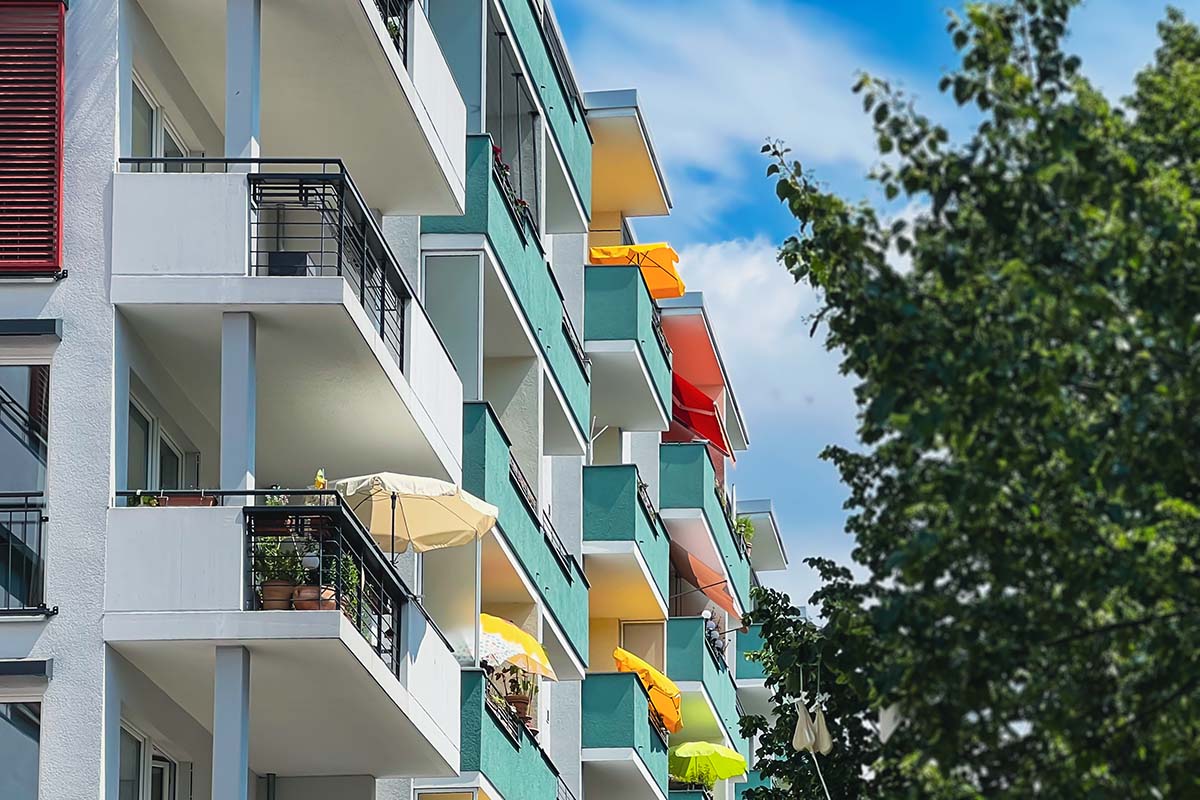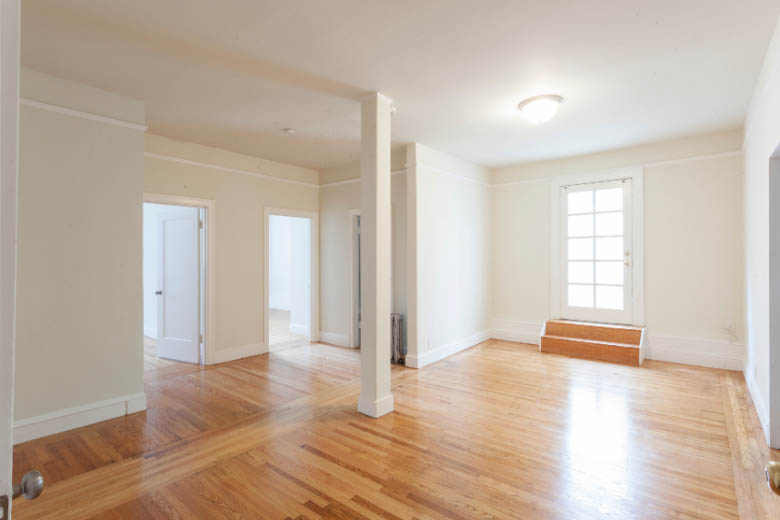
Expats share 12 tips to boost your chances of successfully renting a house, flat or apartment in Germany.
Moving abroad is exciting, but not without challenges. And one of the biggest challenges of moving to Germany is finding an apartment to rent. We know from first-hand experience in Berlin!
You may be tempted to think that you can easily solve this common apartment rental problem across Germany by hiring an estate agent. But before you go ahead and do that. Bear in mind that paying a rental agency won’t guarantee that they’ll find you an apartment (even though they’ll be more than happy to take your money).
But don’t worry. You actually don’t need an estate agent to help you. You can find a house or flat in Germany and complete the entire process on your own quite easily with the right information and resources.
The home and apartment rental market in each city and region of Germany may be slightly different, but these 12 tips are universal.
So whether you’re looking to rent a house, flat or apartment in Germany, be it in Frankfurt, Munich, Hamburg, Dusseldorf, Aachen or Berlin, these tips will help boost your chances and make the process easier.
Related Guide: Rental scams are rife in any city where housing demand is high. This is particularly true in Berlin. Make sure you read our 7 tips to spot and avoid Berlin Apartment scams so you know what to watch out for.
1. Communicate in German
We know this is a tough one. We arrived with only the basic ‘hallo’, ‘bitte’ and ‘danke’ German language skill that we had learnt on Duolingo and managed this task. You can too, so hear us out.
This tip will seriously improve your chances of renting an apartment in Germany. Not only does it show commitment, but it will also boost your chances of getting your rental application shortlisted. Why? Well, you’re making it easier for your potential future landlord to decipher.
Landlords in Germany literally get hundreds of rental applications for a listing. So you want to make the process as easy as possible for them.
This means that even if you can’t necessarily speak German, that you should at the very least write all your e-mails and submit the required documents in German.
Communicating in German may seem daunting at first. But with today’s technology, you can easily use Google Translate, DeepL Translator or ChatGPT to help you. EASY!

If you’re still quite new to learning German, we’d recommend using DeepL Translator or ChatGPT. It gives you the option to translate any language to formal or informal German.
You should always use the formal German language when addressing anyone you’re not familiar with. This includes your (hopefully) future landlord. So make sure to address him or her by the formal version of ‘you’ by using ‘Sie’ and not ‘du’.
Don’t know what we’re talking about? Get ahead and start learning the language with these 22 fun and free ways to learn German online.
Start every e-mail with the formal version of ‘dear’. That would be ‘Sehr geehrte’ and not ‘Liebe’. Follow that by addressing him or her by ‘Herr’ (Mr) or ‘Frau’ (Mrs or Miss) and their surname.
When you’re done with the body of your e-mail, end it with ‘Mit freundlichen Grüßen’ and your name and surname under that.
2. Prepare Documents To Rent Apartments in Germany
Whether you’re renting a room (WG), house, flat or apartment in Germany for short or long term, you’ll need certain documents to apply.
We’ve included a comprehensive list of the documents you’ll need to rent in Germany in our Berlin Apartments Guide. It explains what documents are mandatory or necessary, as well as optional documents you can include to boost your chances of successfully renting an apartment in Germany.
And this leads us to our next important tip. Make sure you have all your paperwork and documents assembled and ready BEFORE you start looking for an apartment or house to rent in Germany.
Competition is fierce across the major cities in Germany. You want to have all your ducks in a row so you can apply as soon as you’ve done an apartment viewing.
3. Create Profile on Germany Apartment Rental Websites
You’ve probably searched for houses or apartments in Germany on popular rental sites like Immowelt, Immonet and Immobilienscout24. But did you know that you could save yourself tons of time (and effort) by registering and creating a profile on these apartment rental platforms?
Not only will it save you the effort of entering your information over and over again every time you submit a new house or apartment rental application. It will also help you to apply faster than other applicants.
Is It Worth Paying Premium for Plus Account?
And now for the big question: is it worth paying these rental sites a premium subscription to increase your chances of renting an apartment in Germany?

The answer depends on who you ask. We’ve personally never paid a premium on these platforms and managed to secure a rental apartment in Berlin (twice!). Other expats swear by the premium subscription, saying it helped them find a rental. But there are also plenty of people who have paid the subscription and found nothing…
Our tip? Instead of paying for ImmoScout Plus, rather spend your hard-earned money on a rental platform like Stekkies. It’s not only cheaper than ImmoScout Plus, but they also receive new rental listings BEFORE they hit the big platforms like Immowelt, Immonet and ImmobilienScout24.
And the cherry on top? Stekkies do screen their listings for possible scams (unlike the other platforms…).
Give Stekkies a go. If you’re not happy with their service after 14 days, they’ll happily give you a refund.
4. Be The First To Respond to New Apartment Rentals
You want to be amongst the first applicants to apply for new rental listings. Like we mentioned earlier, competition is particularly fierce in some cities in Germany.
In this case, you’ll often find that apartment rental listings are only available for a few hours before they’re removed due to high demand.
To make sure you don’t miss these, we’d highly recommend you switch on notifications to immediately receive updates when new apartment listings that fit your search criteria are listed.
This way you can be one of the first to apply, get ahead of the pack and hopefully quickly rent your dream apartment or house in Germany.
Related Guide: Moving into a new apartment in Germany and have no idea how to sign up for electricity? Find out how in our detailed Electricity Providers in Germany guide.
5. Rent A Short Term Apartment in Germany
Your chances of successfully renting a house or apartment in Germany dramatically improves if you’re already in the country. Frustrating, we know. But with so many applicants to choose from, landlords will quickly throw your apartment rental application aside if you’re not in Germany and ready to view the flat at a moment’s notice.
This means that you may need a temporary place to stay while you look.
A good place to look for short term accommodation in Germany are rental apartments on Booking.com and WG Gesucht.
Related Guide: If you’re moving to Berlin, read our 15 Apartment Hotels in Berlin with Anmeldung guide. We’ve done all the leg work on which hotels offer Anmeldung in Berlin and what the minimum stay is to get ‘Wohnungsgeberbestätigung’ (English for confirmation of residence).
Otherwise you can also use Facebook groups to find a short term room or apartment to stay at. Simply use the search bar, type ‘Expats in’ and the name of the German city you’re moving to.
If you’re moving to Berlin, read our How To Rent Apartments in Berlin guide for a list of short and long term apartment rental websites and resources to find your dream home. And if you’re not sure which neighborhood is right for you. We’ve written a detailed Berlin Neighborhoods and Districts guide to help you.
Bonus Tip: If you’re planning to rent a short term apartment in Germany, make sure to ask your landlord whether your rent includes ‘Rundfunkbeitrag’ or TV license fees. The apartment may not have a TV, but you will have to pay this fee regardless. There are certain cases where you may be exempt from paying this fee. Read our Germany TV tax guide to find out what it is and whether you’re exempt from paying!
Save Me For Later

6. Write An Introduction Letter
Including an introduction letter is optional, but we highly recommend it if you want to stand out from all the other folks looking to rent a house or apartment in Germany.
This one-page document acts like a cover letter that you’d write for a job application. The only difference is that this introduction letter would explain who you are and why you have the qualities of being a good tenant.
So begin your introduction letter with who you are, where you’re from, why you’re living in Germany, what you do for a living and even include a fun fact or a few hobbies you enjoy.
Then include a few lines to substantiate and motivate why you have the qualities of being a good tenant. Of course, including facts like you’re not a smoker or don’t have pets may help. But you shouldn’t lie either, so omit it if that’s not the case and you’re not asked.
What’s more important for the landlord is that you’ll be able to pay the rent. So if you’re a student and your parents will be financially supporting you, include that in your introduction letter. If you’re in Germany because of a new job, mention it and include your employment letter.
What you basically want to do is reassure the landlord that you’re a low-risk candidate who will be able to pay your rent on time every month.
Rental laws in Germany (especially in cities like Berlin) makes it very difficult for the landlord to evict or remove a tenant from their property. That’s why landlords are so picky who they select to stay and live in their apartments. Plus, they usually receive hundreds of applications so they really do have the liberty to pick and choose who they do or don’t want.
And lastly, don’t be shy to insert a smiley photo of yourself on this letter. It’s quite normal in Germany to attach photographs for job or even kinder garden and school application forms.
7. Apply As A Couple Or Group
This may seem like an odd tip. But applying as a couple or a group of 2 to 3 friends may help you rent a house or apartment in Germany.
This is not always possible of course, especially if you’re moving to Germany alone. But if you are moving abroad with a partner or are able to find another like-minded friend who is also on the apartment hunt, it may help to apply together.
The reason for this is simple. More people jointly liable to pay the rent often means that there’s more than one source of income. And more than one income source means that there’s less risk that the group or couple won’t be able to pay the landlord.
But before you go this route, bear in mind that ‘jointly liable’ means that you’ll be responsible for paying the entire rent if your flatmate doesn’t. So make sure you pick wisely.

(if you can)
8. Rent Apartments in Areas Less Popular with Expats
There are certain areas or suburbs across every city in Germany that are more popular with expats. These neighbourhoods (or ‘kiez’ in German) are often trendy, vibey and bustling. But they’re also usually much more expensive because of high demand and expats unknowingly overpaying for rent in the area.
Public transport is really extensive in Germany. Even if you’re staying further out, you could easily get to the city centre within 30 to 40 minutes using public transport.
So if you want to improve your chances of finding a house or apartment to rent in Germany (and avoid overpaying) pick neighbourhoods that are less popular with expats.
Bonus Tip: If you’re moving from one apartment or flat in Germany to another. Make sure you use this free mail forwarding service in Germany to redirect your mail from your old to new address. It’s the easiest way to let the banks, insurance companies, and other essential service providers know that you’ve moved. It takes less than 5 minutes to do and you can do it all online!
9. Arrange Private Apartment Viewing
Apartment viewings in Germany can be done on a one-on-one basis, in groups or mass viewings. The last one is actually quite common in high demand cities like Berlin where hundreds of people line up for one apartment viewing!
So if luck is on your side and you’re given the choice, always pick the one-on-one appointments. Not only will this give you more time to view the apartment, but it’ll also give the landlord or agent a better chance to get to know you.

Speak in German if possible, or at least ask in German first whether it’s possible for you to speak in English. Otherwise, bring a friend who can speak German on your behalf.
Be punctual (which means getting there 10 minutes early in Germany) and have all the required documents printed with you.
10. Get Referred By A Friend
In case you haven’t noticed, trust is a big thing in Germany. Just hop into any train station in Germany to experience it first-hand.
It’s one of the few countries in the world where you’re trusted to buy a public transport ticket before getting on the train and there are no ticket-eating turnstiles to stop you.
The same can be said about the apartment rental market in Germany. The landlord may not necessarily trust you per se (you’re a stranger after all). But if you were referred by someone he or she knows, then your likelihood of renting your dream house or apartment in Germany increases substantially.
You see, the landlord trusts the friend who in turn trusts you.
Moral of the story – asking friends and colleagues is a great way to find an apartment to rent in Germany and if they’re willing to refer you, even better.
Related Guide: Planning on moving into a new apartment? Find out 10 things you must do after you sign the rental contract for your new home in our Moving Apartments in Germany Checklist guide.
11. Keep A Record of Apartment Rentals
This tip won’t necessarily boost your success in renting in Germany, but it will make your life a whole lot easier.
You’ll want to keep a record of all the apartment rentals you’ve applied for in Germany. The best way to do this is on a spreadsheet, so use Excel or Google Sheets.
You should keep a record of the basics like the address, rental price, which neighbourhood it’s in, whether you had a viewing (or received a response) and if so, the pros and cons of the house or apartment.
This will save you a lot of time and effort from trying to remember which is what after sending many, many rental applications. Plus, it will give you an indication on whether you should continue applying or just follow up on the ones you’ve shortlisted.
Related Guide: When you’ve finally signed that lease and ready to move into your new apartment. You’ll probably need a moving van to transport your furniture and belongings. Find out how you can easily rent a van in Berlin (or anywhere else in Germany) and how much it costs in our Van Rental in Germany guide.
12. Be Persistent and Don’t Give Up
Our last and most important tip? Be persistent and don’t give up.
Be mentally prepared to send out between 30 to 50+ applications. Some will respond, most will not. But whatever you do, don’t give up and keep trying.
Save Me For Later

Tips For Renting Houses or Apartments in Germany
Here’s a quick summary:
- Communicate in German
- Prepare all your documents needed to rent in Germany
- Create a profile on all Germany apartment rental websites
- Be the first to respond to new apartment rental listings
- Rent a short term apartment in Germany
- Write an introduction letter
- Apply as a couple or a group
- Rent apartments in areas less popular with expats
- Arrange private apartment viewings
- Get referred by a friend
- Keep a record of apartment rental listings
- Be persistent and don’t give up
Once you’ve found your dream house or apartment to rent in Germany, you’ll need to register your address or do your ‘anmeldung’. Read our How To Get Anmeldung in Germany guide to find out how.
Found this step-by-step guide useful? You may also like to know how you can convert your foreign driver’s license in Germany, how to sign an electricity contract in Germany or how to go about paying the mandatory Germany TV tax. Our guides will help!
Planning on moving to Germany soon? Make sure to read our other Moving to Germany Guides.





